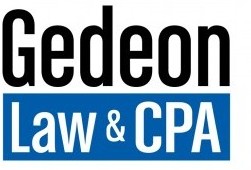In the spirit of giving this holiday season, Gedeon Law & CPA put together a quick list of some simple last minute tax strategies that can help reduce your year-end tax liability.
Stop Invoicing Customers
For taxpayers on a cash basis, this easy strategy will instantly reduce your taxable income for the year. Regardless of what type of business you run, pushing off invoicing customers and collecting outstanding invoices until the following year is a simple tax planning strategy any business owner can follow.
John Elton, a successful costume designer, normally bills his customers at the end of each week. In December, however, John decides not to bill his customers during the month. Instead, John saves those invoices and mails them in the first week of January. By waiting to mail out his invoices, John has shifted income from December into the following year and postponed paying the taxes on this income as well.
Prepay Your Expenses
This little strategy is a gift from the IRS.
Thanks to an IRS Regulation not to many people know about, the IRS has actually created a safe harbor rule that allows cash basis taxpayers to prepay and deduct qualifying deductions up to 12 months in advance provided the expense does not extend beyond the end of the following tax year.
This means you can prepay expenses such as car lease payments, rent, equipment lease payments, insurance premiums, and service contracts in advance to accelerate your tax deductions.
With a little twist, this strategy can also create a tax benefit for your vendor, giving you and your vendor the best of both worlds.
Here’s how it works.
Fred Norris rents office space at $2,000/month. Since Fred is flush with cash at the end of 2013, he decides to prepay his entire 2014 rent of $24,000 in 2013. So Fred mails a check by certified mail to his landlord on December 31st to cover the 2014 rent. The landlord, of course, doesn’t receive the check until sometime in January 2014.
Thanks to this timing difference, Fred is able to deduct the $24,000 rent payment in 2013 while his landlord doesn’t have to report the $24,000 as income until 2014.
Convert Your Personal Car To A Business Vehicle
For those taxpayers who are not able to buy a new car to take advantage of the favorable tax depreciation deductions expiring at the end of 2013, this strategy is your next best bet. Better yet, you don’t have to spend a single extra penny to take advantage of it.
To take advantage of this strategy, all you need is a car titled in your name that you can convert to business use(namely the vehicle is used at least 50% of the time for business) before December 31. This little trick will let you qualify for one of the following bonus depreciation deductions available to taxpayers who actually purchase a new car:
a) Unlimited bonus depreciation on a SUV with a gross weight over 6,000 pounds
b) $11,160 in depreciation on a car weighing under 6,000 pounds
c) $11,360 in depreciation on a SUV weighing under 6,000 pounds
How will this strategy save you on taxes? Let’s look at an example.
Burton owns a S corporation that he started in 2013. In 2011, Burton purchased a new car for $30,000. He started using the car in his S corporation business during 2013, when the fair market value of the car was $20,000. Upon converting the car for business use, Burton keeps a mileage log and it shows that he used it 90% of the time for business during the year. As a result, Burton can now claim bonus depreciation on a basis of $18,000 (90% times $20,000).
There are two caveats to this strategy though. First, Burton should not sell the car to his S corporation because that would destroy his ability to claim the bonus depreciation. Second, since Burton operates his business as a S corporation, he must get the corporation to reimburse him for the vehicle’s business use expenses.
From all of us at Gedeon Law & CPA, we wish you a happy holiday season and a prosperous new year.



